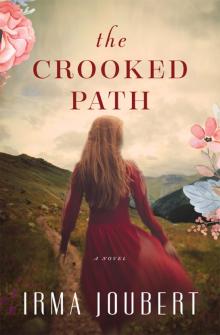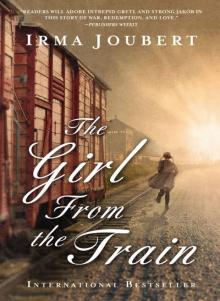- Home
- Irma Joubert
The Girl From the Train
The Girl From the Train Read online
ACCLAIM FOR THE GIRL FROM THE TRAIN
“Richly imagined and masterfully told, a love story so moving it will leave you breathless. And deeply satisfied.”
—TAMERA ALEXANDER, USA TODAY BESTSELLING AUTHOR OF TO WIN HER FAVOR AND THE INHERITANCE
“A riveting read with an endearing, courageous protagonist . . . takes us from war-torn Poland to the veldt of South Africa in a story rich in love, loss, and the survival of the human spirit.”
—ANNE EASTER SMITH, AUTHOR OF A ROSE FOR THE CROWN
“Captivating. Emotional and heart-stirring. Joubert masterfully crafts every scene with tenderness and hauntingly accurate detail. It’s a stunning coming-of-age novel that packs emotion in a delicate weave of hope, faith—and the very best of love.”
—KRISTY CAMBRON, AUTHOR OF THE BUTTERFLY AND THE VIOLIN AND A SPARROW IN TEREZIN
“A fresh voice and a masterpiece I could not put down—one I will long remember.”
—CATHY GOHLKE, CHRISTY AWARD WINNING AUTHOR OF SECRETS SHE KEPT AND SAVING AMELIE
“The Girl from the Train is an eloquent, moving testament to love and its power to illuminate our authentic selves.”
—SHERRY JONES, AUTHOR OF THE SHARP HOOK OF LOVE
The Girl from the Train © 2015 by Irma Joubert
Irma Joubert, Tussen Stasies © 2007 by LAPA Uitgewers (Edms.) Bpk, Pretoria, South Africa
All rights reserved. No portion of this book may be reproduced, stored in a retrieval system, or transmitted in any form or by any means—electronic, mechanical, photocopy, recording, scanning, or other—except for brief quotations in critical reviews or articles, without the prior written permission of the publisher.
Published in Nashville, Tennessee, by Thomas Nelson. Thomas Nelson is a registered trademark of HarperCollins Christian Publishing, Inc.
Thomas Nelson titles may be purchased in bulk for educational, business, fund-raising, or sales promotional use. For information, please e-mail [email protected].
Scripture quotations are from the Holy Bible, New International Version®, NIV®. Copyright © 1973, 1978, 1984, 2011 by Biblica, Inc.™ Used by permission of Zondervan. All rights reserved worldwide. www.zondervan.com. The “NIV” and “New International Version” are trademarks registered in the United States Patent and Trademark Office by Biblica, Inc.™
Publisher’s Note: This novel is a work of fiction. Names, characters, places, and incidents are either products of the author’s imagination or used fictitiously. All characters are fictional, and any similarity to people living or dead is purely coincidental.
Translation: Elsa Silke
ISBN 978-0-529-10292-8 (eBook)
Library of Congress Cataloging-in-Publication Data
Joubert, Irma, author.
[Meisje uit de trein. English]
The girl from the train / Irma Joubert; Translation by Elsa Silke.
pages cm
ISBN 978-0-529-10237-9 (paperback)
1. Afrikaans fiction—21st century. I. Silke, Elsa, translator. II. Title.
PT6592.2.O795V4713 2015
839.3636—dc23 2014047546
15 16 17 18 19 20 RRD 6 5 4 3 2 1
To my son Jan-Jan
CONTENTS
GLOSSARY
1
2
3
4
5
6
7
8
9
10
11
12
13
14
15
16
EPILOGUE
ACKNOWLEDGMENTS
SOURCES
ABOUT THE AUTHOR
GLOSSARY
biltong—a dish of jerked meat
Bloedsap—a staunch supporter of the United Party, South Africa’s ruling political party between 1934 and 1948
Boer War/Anglo-Boer War—The Second Boer War was fought from October 1899 to May 1902 by the United Kingdom against the South African Republic (Transvaal Republic) and the Orange Free State. The war ended in victory for Britain and the annexation of both republics.
Brandwag, Die (The Sentinel)—a weekly Afrikaans magazine, discontinued in 1965
eisteddfod—a competitive festival of music and poetry
Great Trek—an eastward and northeastward emigration away from British control in the Cape Colony during the 1830s and 1840s by Boers
Huisgenoot, Die (House Companion)—a weekly Afrikaans-language general-interest family magazine; SA’s biggest and oldest family magazine (est. 1916)
Jan van Riebeeck—Dutch colonial administrator and founder of Cape Town
kraal—an enclosure for cattle or other livestock surrounded by a stone wall or other fencing, roughly circular in form
kugeln—ninepins/cones
lametta—tinsel
matric (matriculation)—the final year of high school and the qualification received on graduating from high school
oom—uncle
ouma—grandmother
rag—for “raise and give”; university-level, student-run charity fund-raising organization
rusk—a hard, dry biscuit
sakkie-sakkie—a simple, rhythmical style of Afrikaner music and dance
Slagtersnek—an early nineteenth-century rebellion in the Eastern Cape that played a role in the Great Trek
tannie—aunt
tickey—On February 14, 1961, South Africa adopted a decimal currency, replacing the pound with the rand. The term tickey is applied to both the 3d and 2½c coins.
volkspele—South African folk dances
weinachtskerzen—Christmas candles
1
SOUTHERN POLAND, APRIL 1944
“Let go!” her grandmother said.
She held on for dear life. The metal edge bit into her fingers. Her frantic feet searched for a foothold in the air. The dragon swayed dangerously from side to side.
“Gretl, let go!” Her grandmother’s shrill voice cut through the huffing noise of the dragon. “We’re nearly at the top, you must let go now!”
The child looked down. The ground was a long way below. Strewn with sharp stones, it sloped down into a deep gully.
Her arms were aching.
Her fingers were losing their grip.
Then her grandmother pried her fingers loose.
Gretl hit the ground. Shock jolted through her skinny little body.
She fell, slid, rolled down the embankment, stones grazing her face and legs. She clenched her jaw to stop herself from screaming.
At the bottom she slid to a stop. For a moment she lay panting, her heart pounding in her ears. It was so loud that she was afraid the guards might hear.
“Roll into a ball. Tuck in your head and lie very still,” her grandmother had told her. “And don’t move until Elza comes to find you.”
She rolled into a ball. The earth trembled. Beside her, around her, she felt sand and stones shifting. She kept her head down. Above her the long dragon was still groaning and puffing up the hill, spitting smoke and pumping steam. She could smell its rancid breath, but she didn’t look.
It was at the top now. She heard it panting, the iron wheels clickety-clac
king faster and faster on the track.
She was very thirsty.
It was dead quiet.
Slowly she opened her eyes to the pitch-black night. There were no stars.
“What if we’re afraid?” Elza had asked.
“Then you think about other things,” Oma had said.
Mutti had just cried, without tears, because she had no more water in her body for tears. I’m not afraid, Gretl thought. I escaped from the dragon. First Elza, then me. I’m brave. So is Elza.
Carefully, painfully, she rolled onto her back and straightened her legs. They were still working, but her knee burned.
At the next uphill, Mutti and Oma would jump out as well. Then they would all go back to Oma’s little house at the edge of the forest. Not to the ghetto.
There was sand in her mouth. No saliva. If only she could have just a sip of water.
Gingerly she rubbed her smarting knee. It felt sticky and clammy.
The water had run out yesterday, before the sun was even up. At the station the grown-ups put their arms through the railings of the cars and pleaded for water. But the guards with their rifles made sure that no one gave them any. The dogs with the teeth and the drooling jaws barked endlessly. And drank sloppily from large bowls.
The train had filled its belly with water.
“Don’t look, think about other things,” Oma had said. Oma’s face looked strange, blistered by the sun. She had lost her hat.
Her voice had been strange as well. Dry.
Later Mutti stopped crying. Just sat.
It was hard to think about other things.
Gretl wasn’t afraid of the dark. “Darkness is your best friend,” Oma had said. “Get as far away from the railroad as possible while it’s still dark. And hide during the day.”
But now there were no stars at all, and the moon appeared only briefly from behind the clouds. Now and again there was a flash of lightning.
She wasn’t afraid of lightning. Maybe it would rain soon. Then she would roll onto her back, open her mouth, and let the rain fill her up until she overflowed.
She had to think about other things.
Oma had a little house at the edge of the forest. Like Hansel and Gretel’s, but without the witch. In the forest they picked berries. She knew there was no wolf, but she always stayed close to Mutti or Elza just the same.
Maybe she should sit up and softly call Elza’s name. The guards and their dogs were gone, over the hill. She no longer heard the choo-choo and clickety-clack. Elza would never find her in this blackness.
She sat up slowly. Her head ached a little. She peered into the curtain of fog that surrounded her, trying hard to focus. She could see nothing.
“Elza?” Her voice was thin.
She took a deep breath. “Elza!” Much better. “Elza! El-zaa-a!”
Not even a cricket replied.
Jakób Kowalski moved the heavy bag to his other shoulder. Flashes of lightning played sporadically among the dense clouds. It was their only source of light. The terrain was reasonably even underfoot, but as soon as they started the descent toward the river they would need to see where they were going. He ran his fingers through his black hair and screwed up his eyes.
“I can barely see a thing,” said Zygmund behind him. At odd intervals his voice still cracked. He was barely fifteen.
“And the rain is going to catch us,” Andrei complained. “Why do we have to do it tonight?”
“The coded message said the troop train will pass here just before daybreak, on its way back to Germany.” Jakób felt his patience wearing thin. The Home Army had given him two adolescents to help with this dangerous mission. “We must plant the bombs under the bridge before then.”
“And you’re sure there are no guards on the bridge?” asked Andrei.
“I’m not sure of anything,” Jakób replied brusquely, “except that we’ve got to blow up the bridge tonight.”
In silence they progressed slowly under the weight of their cargo through the tall grass and bushes. When the moon appeared for a moment from behind the clouds, Jakób said, “Let’s go down here.”
“Will we have to swim downstream?” Andrei asked. “Or clamber over the rocks?”
“It’s going to be hard with the bags,” said Zygmund.
“Are you in or are you out?” Jakób asked, exasperated. “If you’re in, shut your traps.”
They struggled down the steep slope, slipping in places, clinging to their dangerous load. The clouds seemed to be lifting somewhat, and once or twice the moon showed its face. Dislodged stones rolled down the slope, splashing into the water.
The final trek to the bridge took them more than half an hour. The water rushed past, glimmering in the faint moonlight. They tried to stay at the water’s edge, but the pebbles were round and smooth and the bank was steep. The heavy bags dragged at their shoulders. The darkness provided good cover, but it also made the going tough. After every few steps Jakób stopped to listen, trying to figure out where they were. Then the clouds lit up faintly in the distance, there was a crash of thunder, and Jakób saw the bridge about ten yards ahead.
We’re here, he motioned.
The other two showed him a thumbs-up.
At the bridge, Jakób placed their bags at the foot of the second column. Zygmund took off his boots, then his coat. Jakób tied two ropes around his waist. I’m going up, Zyg motioned, and he began to climb.
His progress was painfully slow. He found an occasional foothold on the crossbars of the smooth, steel column, but for the most part he had to hoist his wiry body up by his own strength. Fortunately the clouds seemed to be receding. Jakób stared upward, tension tightening between his shoulder blades, but all he could see was an occasional vague movement. Next to him Andrei stood waiting to catch the ropes. It was dead quiet.
After what seemed like an eternity, they saw both ends of one rope dangling in front of them, swinging beside the steel column. They attached the first bag to one end, then Jakób and Andrei pulled on the opposite end while Zyg worked at the top, all three of them lifting the shells together, inch by inch, careful not to let the bag swing.
After the bag with its hazardous contents arrived safely at the top, they transported the second load, a landmine acquired after the Home Army regaled a Russian battalion with homemade vodka, then relieved them of an entire consignment of light weaponry.
The third load was more difficult. It was an unexploded two-hundred-pound bomb left behind when the Nazis had passed through Poland in 1940. The slightest jolt might set it off. It took all Jakób’s and Andrei’s strength to hoist the bag.
When it was at the top, Jakób said, “Hold it steady. I’ll tie the rope to the base of the column.”
“Okay, but hurry,” Andrei answered, panting.
When the rope was firmly secured, Zyg sent down the second rope for Jakób to climb. He removed his shoes and tested it before he began his ascent. He hauled his lithe body up the rough cord without too much difficulty, his muscles honed since boyhood by farm labor, his hands toughened over the past three years at the steelworks. A moment later he sat on the crossbar next to Zygmund.
Zyg clung to the bag containing the bomb. Together they found a good position for it under the track. It was a pity they had to sacrifice the sturdy bag, but removing the heavy bomb was too dangerous. Next they planted the landmine, took a final look around to make sure everything was ready, and began their careful descent.
The return journey was a lot easier. They were rid of their heavy load, and the clouds that had been obscuring the moon were dispersing. The two
boys were frantic to get away, as if they had only just realized the adventure was real.
Jakób looked at the sky. In less than an hour, he reckoned, the moon would set. It would be about another three hours before daybreak.
Zygmund said, “I hear a train.”
“Impossible,” said Jakób.
“It’s a train,” Zygmund insisted.
They turned and looked downriver in the direction of the bridge, which was no more than two hundred yards from their present position.
Then Jakób heard it as well. “Find shelter!” he shouted. “Behind this rock! Quick!”
They scurried over the loose stones, then threw themselves down behind a low, flat rock. “Will this be enough cover?” asked Zygmund.
“It’ll have to do,” said Jakób.
He saw a light drilling a tunnel through the darkness and felt shock shoot through his body. “The train is coming from the wrong direction!” he exclaimed. “It can’t be the—”
A brilliant flash lit up the sky, the horizon exploded with an incredible boom, and a blinding light shot upward, as if an enormous thunderstorm had been let loose over the bridge.
“God help us!” said Andrei, covering his head with both hands.
There were the sounds of steel ripping apart, of people screaming.
A second blast followed, louder than the first. Zygmund drew his head into the shell of his body. “Mother Mary!” he sobbed.
Andrei cursed and crossed his broad chest twice.
“That was the boiler exploding,” said Jakób.
But where had this train come from? From the wrong side? On its way to . . .
In a flash he knew. Nausea pushed up in his throat, bitter as gall. “Come,” he said. “Let’s go.”
Gretl jumped. She recognized the sound of bombs, knew she had to find shelter. The clouds on the horizon had a red glow. The explosion came from the other side of the hill.
It was far away, but the enemy could move fast.
In the gloom she crawled up the embankment and struggled to her feet. She could just make out the shapes of the bushes and tall trees flanking the railroad.

 Child of the River
Child of the River The Crooked Path
The Crooked Path The Girl From the Train
The Girl From the Train